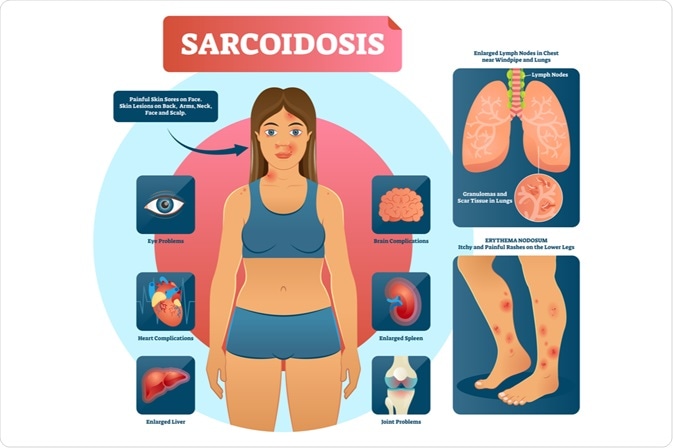The symptoms of sarcoidosis vary significantly between patients due to the size, number, and location of the nodules that characterize the health condition. There may be one area of the body that is most affected, which is typically the lungs and/or chest area or several body organs, which may lead to specific symptoms.
Some people with the condition do not experience troublesome symptoms and the diagnosis is made on X-ray findings alone. However, for other patients, the symptoms may be debilitating and require ongoing management for normal daily activities.
Often, symptoms develop over a short period of time and improve spontaneously without treatment, known as acute sarcoidosis. Some patients find that symptoms gradually worsen over time to become more severe, known as chronic sarcoidosis.

Image Credit: VectorMine / Shutterstock.com
General symptoms
There are some symptoms affecting many patients that are considered general, as they are not linked to the formation of nodules in a particular area of the body. These include:
- Fever
- Loss of appetite
- Weight loss
- Fatigue
- Depression
- Headache
More commonly, specific symptoms develop due to the formation of nodules in specific areas of the body.
Lungs
The lungs are one of the most common areas of the body to be affected by sarcoidosis and thus lead to symptoms. In fact, it is estimated that approximately 9 out of every 10 people with sarcoidosis will have their lungs affected by this condition.
Sarcoidosis that affects the lungs may present as:
- Dyspnea (shortness of breath)
- Persistent dry cough
- Wheezing
- Chest pain
- Hemoptysis
Skin
Approximately 25% of patients experience skin changes due to granulomas in or near the skin. This may include erythema nodosum, which is a common rash on the shins, lupus pernio, which is a rash that can arise on the nose, cheeks, chin, or ears, or simple as tender red bumps or patches on the skin.
Heart
The heart can be affected by nodules forming directly in the heart tissue or due to changes that arise from nodules in the neighboring lungs. Cardiac symptoms may include:
- Bradycardia
- Arrhythmia
- The enlarged right side of the heart (due to lung changes)
- Cardiomyopathy
Changes to the heart and cardiomyopathy can lead to potentially fatal outcomes such as heart failure. Therefore, the presence of these complications should be established as soon as possible for appropriate management.
Nervous System
Neurological symptoms that may arise as a result of nodules forming in or near nerves may include:
- Dysphagia
- Drooping of face
- Vision problems
- Hearing problems
- Numbness
- Prickling sensation
- Meningitis
Eyes
Patients with nodules close to their eyes may experience related symptoms such as:
- Uveitis
- Red eyes
- Painful eyes
- Dry eyes
- Blurred vision
It is important for patients with sarcoidosis that notice changes in their eyesight to seek medical attention immediately to reduce the risk of lasting damage.
Other specific symptoms
According to the location of the granulomas, there are several other specific organs or areas of the body that may be affected in sarcoidosis. The lymph glands, for example, can be affected and cause swollen lumps to arise under the arms, in the neck or in the groins, most of which are usually evident with X-ray imaging. The kidneys can also be affected by this condition, which would be indicated by an increased concentration of calcium in the blood that could lead to the formation of kidney stones.
Enlargement of the liver and spleen can result in the development of abnormal blood clotting factors and anemia, whereas bones that are affected by sarcoidosis can be affected by cysts and cause significant pain. In addition, inflamed muscles and joints, which can cause chronic pain in the affected areas, are also potential complications of sarcoidosis.
References
- http://patient.info/health/sarcoidosis-leaflet
- http://www.nhs.uk/conditions/sarcoidosis/Pages/Introduction.aspx
- http://www.healthline.com/health/sarcoidosis#Symptoms2
- http://www.mayoclinic.org/diseases-conditions/sarcoidosis/basics/symptoms/con-20022569
- https://www.nhlbi.nih.gov/
Further Reading
Last Updated: Nov 8, 2022